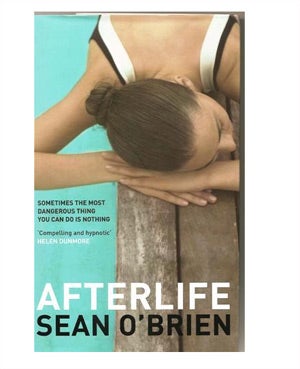A thriller set in the world of contemporary poetry might not sound too exciting, but in his debut novel, the TS Eliot prize-winning poet Sean O'Brien chills to the bone. Martin, our narrator, is a middle-aged academic living quietly in Divott, a sleepy town on the Welsh borders where the only interesting thing that happens is the local poetry festival. The presiding genius is the 17th-century divine and religious poet Thomas Exton, but the town has another claim to literary fame. The novel begins with the re-interment of the dead poet, Jane Jarmain, in Divott, home to her growing cult since her death, aged 23, in the 1970s. Jane's new grave yawns, and her lover Alex, Martin's old friend and the unworthy keeper of the flame, is in town to preside over the mournful celebrations. But Martin knows where all the bodies are buried, as it were, and is finally prepared to reveal what really happened to Jane one stifling summer 30 or so years ago.
We flash back, and just out of college, Martin, Jane and Alex are living in a cottage near the new Academy of the Marches where the two men are postgrads. All three are obsessed with poetry, but while Martin has a clear sense of his own slender talent, Alex's jealousy of Jane grows ever more toxic.
O'Brien creates marvellously horrible characters to stir his rancid brew of 1970s counter-cultural hedonism and sexism. More pathetic than wicked is the cool American academic Marcie, who unravels spectacularly over the summer. She lives in Moon House, a Tudor-Jacobean-Gothic monstrosity owned by the university; Martin considers it "a great place to write stories or to do evil". Diane is the catalyst, a brash Chicagoan film-maker who wants nothing to do with poetry, sensitivity or indeed England. It is her idea to have a wild, drug-fuelled party in the house and the surrounding woods. The Hell's Angels turn up and, scarcely less frightening, Dieter and Irmgard, a mysterious Baader-Meinhof-type duo ("We're here though for the party, ja?"). They envisage a world without rules, charm or decency; but Martin tends to be aroused by females, however unpleasant, which perhaps accounts for his inertia as the atmosphere gets steadily worse.
The big idea is that Martin is racked with guilt, not for anything he did that summer, but for what he failed to do. Actually, though, the plot just seems to proceed very nicely without him. Frequent references to Dante (O'Brien has translated the Inferno) underline a concern with the nature of evil. More modishly, the main characters go and see The Wicker Man "on the last leg of [its] release", adding to the devilish atmosphere. The final pages deliver a denouement that makes us see Martin, this Prince Hamlet of the Marches, in a scary new light. There's nothing ennobling about poetry; and as O'Brien shows, to be haunted by language leaves the back door open to other kinds of haunting, too.
Subscribe to Independent Premium to bookmark this article
Want to bookmark your favourite articles and stories to read or reference later? Start your Independent Premium subscription today.


Join our commenting forum
Join thought-provoking conversations, follow other Independent readers and see their replies